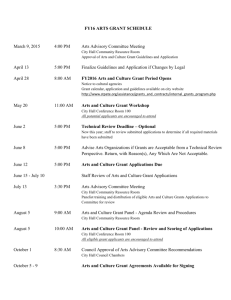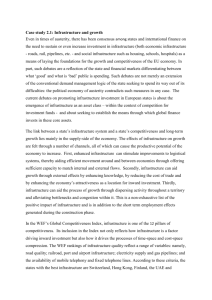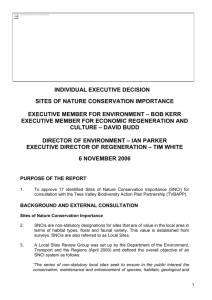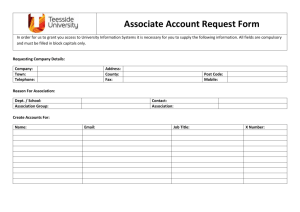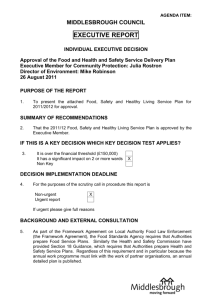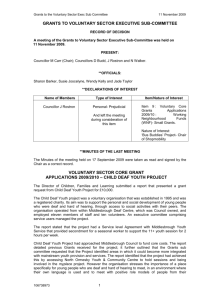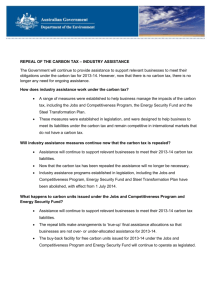Single Member Exec - Biz Development Grants Package
advertisement
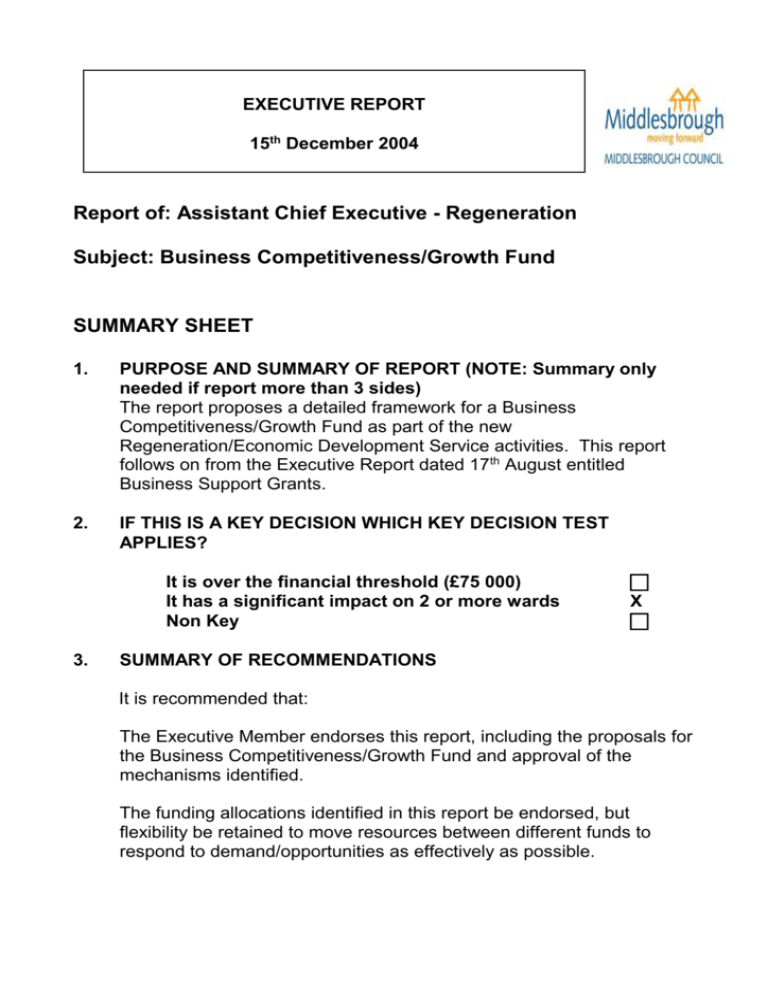
EXECUTIVE REPORT 15th December 2004 Report of: Assistant Chief Executive - Regeneration Subject: Business Competitiveness/Growth Fund SUMMARY SHEET 1. PURPOSE AND SUMMARY OF REPORT (NOTE: Summary only needed if report more than 3 sides) The report proposes a detailed framework for a Business Competitiveness/Growth Fund as part of the new Regeneration/Economic Development Service activities. This report follows on from the Executive Report dated 17th August entitled Business Support Grants. 2. IF THIS IS A KEY DECISION WHICH KEY DECISION TEST APPLIES? It is over the financial threshold (£75 000) It has a significant impact on 2 or more wards Non Key 3. X SUMMARY OF RECOMMENDATIONS It is recommended that: The Executive Member endorses this report, including the proposals for the Business Competitiveness/Growth Fund and approval of the mechanisms identified. The funding allocations identified in this report be endorsed, but flexibility be retained to move resources between different funds to respond to demand/opportunities as effectively as possible. 4. DECISION IMPLEMENTATION DEADLINE For the purposes of the scrutiny call in procedure this report is Non-urgent Urgent report X If urgent please give full reasons For the purposes for the Scrutiny Call-In procedures this report is considered to be non-urgent. BUSINESS COMPETITIVENESS/GROWTH FUND EXECUTIVE MEMBER FOR ECONOMIC REGENERATION & CULTURE PURPOSE OF THE REPORT 1. The purpose of the report is to outline a detailed framework for the development of a Business Competitiveness/Growth Fund to support the Council’s Economic Development objectives. BACKGROUND AND EXTERNAL CONSULTATION 2. A report was brought before CMT on 5th August and subsequently approved by the Executive Member for Regeneration on 17 th August, outlining a framework for business support grants as per below: Start-Up Fund – grants of up to £1,500 aimed at new businesses within Middlesbrough to encourage entrepreneurship; Business Competitiveness/Growth Fund – grants aimed at existing businesses and potential inward investors to encourage their support and growth; Tees Valley/Business Planning Grants – grants to be used in conjunction with Tees Valley Regeneration to be offered to potential inward investors, or indigenous businesses planning large scale investments, to help lever additional funding via the production of business plans; Strategic Grants – grants to cover occasions where a particular investment requires funding but falls outside the parameters of general grant schemes. 3. The Business Competitiveness/Growth Fund was put forward in order to encourage and support the growth of indigenous businesses, attract inward investment, stimulate an enterprise culture, encourage job creation and promote new technology within businesses. However, no detail was submitted as the funding allocation and grant criteria were still to be finalised. This report outlines the relevant criteria for this fund. 4. The purpose of all the funding schemes is to supplement the activities of the council’s revitalised economic development team and to address the comparatively poor economic performance indicators of the Middlesbrough economy. A widely accepted indicator for measuring the wellbeing of the business sector is the number of businesses registered for Value Added Tax (VAT). In 2002, Middlesbrough had a stock of 1,890 VAT registered business, which equates to a ratio of 14 VAT registered businesses per 1,000 resident population. This compares with the Tees Valley ratio of 15 VAT registered businesses per 1,000 resident population, 17 per 1,000 in the North East and 28 per 1,000 nationally. Similarly Middlesbrough’s business stock remains, despite significant diversification over the last decade, behind the sub-regional, regional, and national indicators for diversity (by both size and sector) and competitiveness. For example, Middlesbrough’s GDP per head was £9,997 in 1998 compared to £10,683 for the Tees Valley and £12,548 nationally. 5. This proposal forms part of the programme laid out within the Promoting the Economic Vitality of Middlesbrough theme of the Corporate Performance Plan 2004/05, to tackle the poor economic performance of the town, namely to: support the growth of indigenous business and provide a positive environment for inward investment; regenerate the key economic locations in the town; promote regeneration through culture, arts and learning. 6. Although this proposal will only form a small part of this process, it is anticipated that it will provide access for the Economic Development team to work with businesses in Middlesbrough and support them in order to help achieve the overall targets. 7. NRF funding to support economic development activities is in place for 2004/5 and 2005/6 and will fund all the grant schemes including this proposal. The possibility of attracting further ERDF funding to supplement the fund is also being explored. 8. Informal consultation as to the demand and format of these funds, has taken place with a number of business support agencies, including: Business Link; Inbiz; Walker Hall Associates; Northern Pinetree Trust; Tees Valley Regeneration; North East Chamber of Commerce; and Federation of Small Business The result of this consultation was support for the introduction of a grants package to support Middlesbrough businesses. 9. Middlesbrough’s stock of existing businesses demonstrates poor indicators in terms of competitiveness and growth. It is proposed that the Business Competitiveness/Growth Fund be established in association with other business support agencies (Business Link, North East Chamber of Commerce, Federation of Small Businesses, etc), with the following aims: to support the growth of indigenous businesses who have been trading for longer than six months, or to support high-growth business start-up’s; to provide a positive environment for inward investment; to stimulate a stronger enterprise culture; to encourage job creation; to promote new technology within indigenous businesses; and to promote greater productivity within indigenous businesses. 10. Detailed proposals for the establishment of the Competitiveness/Growth Fund are attached at Appendix 1. In essence a grant fund will be established offering grants of up to £15,000 to be available to businesses located or intending to locate in Middlesbrough, which meet the fund’s priorities. 11. It is proposed that an initial commitment of £40,000 will be made to this fund in 2004/5 as a pilot phase up to 31 st March 2005. An evaluation will be undertaken at the end of 2004/5 to determine the scheme’s impacts. 12. The proposed assessment and approval process is as follows. The process for considering applications would firstly be via a panel consisting of staff from Middlesbrough Council Economic Development Team, Business Link, a representative from one of the high street banks, and an accountant from a local firm. The panel would make a recommendation for approval or rejection. Following the recommendation by the panel, the approval mechanism would be by delegated powers to the Head of Economic and Community Regeneration with quarterly reporting to the Executive Member for Regeneration. 13. This grant alongside the other funds that are already established, will provide a useful tool to enable the Economic Development team to form a pro-active approach with local businesses. OPTION APPRAISAL/RISK ASSESSMENT The following options are available: 14. Do nothing – the impact of the proposal being declined would be to miss a chance of accessing an opportunity to improve the comparatively poor performance of the Middlesbrough economy, specifically with regards to indigenous businesses and inward investment. At present the economic performance indicators show that Middlesbrough has poor VAT registrations, lower business stock and poor GDP per head. These indicators show that Middlesbrough is behind the sub-regional, regional and national indicators and by not addressing these, there is a substantial risk of these indicators continuing to show poor performance and declining further. 15. Approve the proposal – by approving the proposal, this financial incentive would form part of a process to make Middlesbrough more attractive to further investment by indigenous businesses and inward investors. Although the grant will only assist a small number of businesses, it is anticipated that it will provide the economic development team with a good tool to work with a number of businesses and to enhance the role of Middlesbrough Council within the business community FINANCIAL, LEGAL AND WARD IMPLICATIONS 16. The following table provides an updated summary of the financial implications for all the Business Grant Schemes: Grant Scheme Business Start Up Grant Business Competitiveness/Growth Fund Tees Valley/Business Planning Grants Strategic Grants Budget (£) 40,000 Maximum Grant (£) NRF Resident – 1,500 Other – 1,000 15,000 10,000 3,000 10,000 TBC 50,000 17. The above allocations will be made from the £400,000 of Neighbourhood Renewal Funding that was allocated to support economic development activities for 2004/5 and 2005/6. 18. It is proposed that the above commitments are made from the NRF fund as a pilot phase and that evaluation will take place at the end of 2004/5 to determine the impact. 19. Should these incentives prove successful then the scheme will be built into the medium term financial plan. 20. It is a scheme, which enables proactive intervention with a significant potential multiplier effect in that it is anticipated that significant levels of private sector investment will be secured on the back of Council grant. RECOMMENDATIONS It is recommended that: 21. The Executive Member for Regeneration approve this report. 22. The funding allocations identified in this report be endorsed, but flexibility be retained to move resources between different funds to respond to demand/opportunities as effectively as possible. REASONS The recommendations are made for the following reasons: 23. to address the comparatively poor economic performance indicators of the Middlesbrough economy, including the number of VAT registrations, etc; 24. to support indigenous businesses to expand and grow and attract inward investment to Middlesbrough; and 25. to continue to raise the profile of Middlesbrough Council within the business community and re-emphasize the Mayor’s Open for Business theme. BACKGROUND PAPERS The following background papers were used in the preparation of this report: CMT Report – 24th November 2004 – Business Competitiveness/Growth Fund Executive Report – 17th August 2004 – Economic Development Business Development Grants AUTHOR: Richard Dowson, Economic Development TEL NO: 01642 729560 __________________________________________________________________ Address: PO Box 99A, Town Hall, Middlesbrough. TS1 2QQ Website: http://www.middlesbrough.gov.uk Appendix One Detailed Proposal to Establish a Business Competitiveness/Growth Fund Objectives 1. One of the priority areas for the Council’s economic strategy will be to support business development and growth in the town and contribute to the establishment of a more entrepreneurial culture. 2. To support this the objective is that the Council will establish a Business Competitiveness/Growth Fund alongside the existing Business Grant Schemes. This fund will have the following objectives: to support the growth of indigenous businesses; to support the formation of high-growth start-up businesses; to provide a positive environment for inward investment; to stimulate a stronger enterprise culture; to promote new technology within indigenous businesses; to promote greater productivity within indigenous businesses to particularly support business growth in priority sectors: knowledge based businesses; businesses with the potential for future growth; and businesses which add to broader regeneration objectives; to encourage businesses to expand and grow, to create additional jobs, and to achieve the VAT registration threshold; to complement and add value to other measures in place to support the growth of businesses, including Business Link services, other grant regimes, etc; and to encourage businesses to become involved with business support networks and the take up of other business support services. Proposal 3. A grant fund will be established offering grants of up to £15,000 to be available to businesses located or intending to locate in Middlesbrough, which meet the fund’s priorities. 5. Certain businesses would be excluded from the scheme as follows: 5. car related activities, taxis, nightclubs, public houses or bars, betting or gaming establishments, personal services and retail businesses serving predominately local markets, and which do not add distinctiveness or diversity to Middlesbrough’s offer, including take-away food retail businesses, or any activities involving politics, religion, pornography and clairvoyancy; and businesses whose activities might bring the Council into disrepute. Grants will be targeted at companies who have been trading longer than six months (i.e. excluding those that can receive support via the Business Start-Up Grants), high-growth business start-up’s who will require more funding than available via the existing Start-Up Fund, and companies who cannot receive financial assistance from other sources such as Business Link, Selective Finance for Investment (SFI), etc. 6. Grant assistance is aimed at job creation or improved competitiveness within the Middlesbrough Council boundary and it is anticipated that all projects will have some job creation elements to them or with some significant improvements in business competitiveness. Scheme Administration 7. Middlesbrough Borough Council would administer the scheme. 8. A fast response in decision making on financial support is essential. However, any decision making process needs to be thorough and accountable. The process outlined below is designed to satisfy these requirements. 9. A key part of the process involves the use of an independent panel, which assesses and advises on grant applications. The panel is chaired by a member of the Middlesbrough Council Economic Development team and consists of the following representatives: Business Link; a representative from one of the high street banks; and an accountant from a local firm. Members of the panel are required to declare any interest in an applicant’s business, both past and present, to enable a suitable alternative member to be found. The panels’ decision will be via consensus and will be dependent upon the number of applications compared to the budget available. 10. The integrity of the decision making process is essential and a clearly defined two stage process is followed. Stage One – Application and Evaluation of Projects 11. A Business Development Officer of Middlesbrough Council will visit the business and discuss the project. The business will be notified that the grant scheme will be a competitive process due to budgetary restraints and that the quality of application will be critical. If there is merit in an application the business will be asked to develop a business plan, complete an application form and a statement of interest from each principal behind the venture. The business plan is expected to be in a standard format, including the relevant financial projections. 12. Applicants who have been in business for 12 months or more will be expected to provide their most recent accounts. In the case of limited companies, these are audited accounts. 13. The following assessment criteria are taken into account when considering applications: Will the project/business go ahead without MBC assistance? If yes, how will MBC assistance improve the viability/performance of the project? Will MBC assistance: - reduce risk; - reduce gearing ratios - improve initial cashflow position; and - otherwise improve the potential for success. Will the project increase local competition? If yes will this have an adverse effect on existing businesses within the town? How will the project lead to improved business performance? How will the improved performance be demonstrated in financial or market terms? How many jobs will be created? Experience of the management team. Answers to the above questions will be crucial to the decision making process, given the budgetary constraints. 14. The emphasis will be placed on the applicant to develop a business plan. Business Development Officers are available to guide on this process, to enable a company to submit an application, which covers the panel’s requirements as fully as possible. 15. The business plan will be then evaluated by the Business Development Officer and a report written for presentation to the panel with information provided by the business (see 3.6.1) 16. This process is carried out in conjunction with a Business Adviser/Counsellor from the business support network if they are assisting the business. 17. An informal information check will be run, either on the company or the individuals in the case of partnerships or sole traders to check for poor credit history and disqualified directors, etc. Stage Two – Appraisal and Decision Formulation 18. Once the Business Development Officer considers they have all the pertinent information, their report together with the business plan and other information is circulated to panel members. 19. The panel members then appraise the information received. 20. There follows a meeting of the panel, at which the Business Development Officer presents applications. 21. If any member of the panel requires additional information or clarification on aspects of the application, then the recommendation is deferred until further satisfactory information is received. 22. Once the panel is satisfied that enough information and clarification is available to make a final decision, the panel will make a recommendation as to whether the application should be approved, or declined and, in the case of approvals, recommend a level of support. 23. All panel decisions are fully minuted, including any points of clarification and the panel’s ultimate recommendation. 24. Following the recommendation by the panel, if positive the approval mechanism for this scheme would be by delegated powers to the Head of Economic and Community Regeneration with quarterly reporting to the Executive Member for Regeneration. Follow Up and Monitoring Process 25. Successful applicants for grant assistance are notified in the form of an offer letter. This offer letter includes: - 26. The amount of assistance being offered. 27. Any conditions that may be attached to the grant, e.g. the increase of full time employees anticipated, the purpose of the grant. 28. Details of any clawback, which may be imposed on the business. This includes: full repayment of the grant should the business cease trading or move outside the boundaries of Middlesbrough within two years of receiving the grant; and full repayment of the grant should the terms & conditions of the grant not be met; 29. Businesses awarded assistance will be monitored in the following ways: Business Development Officer making regular visits to the company; businesses to provide quarterly management accounts and final annual accounts, audited in the case of limited companies; six-monthly telephone questionnaires/on-site surveys; and completion of annual pro-forma to confirm the number of full time employees (or equivalent) the business has. The length of time of the monitoring process is dependent upon the individual projects, and is determined as part of the decision making process. Funding Available 30. An initial commitment of £40,000 has been made to this fund in 2004/5 as a pilot phase. Evaluation will be undertaken at the end of 2004/5 to determine the scheme’s impact on supporting indigenous businesses (via enquiry/business support programme entry-rates), and on business sustainability (via comparison with previous rates). Evaluation will also include qualitative as well as quantitative evaluation of scheme impact with businesses, including the popularity of the scheme, i.e. number of expressions of interest and applications. 31. To avoid disruption to the scheme and unnecessary distortion of support available, and to maintain momentum, a commitment of £40,000 will also be made to the scheme in 2005/6 whilst the evaluation is undertaken. Future funding for the scheme will be subject to the evaluation. It may be possible to secure additional ERDF funding and this is being explored. 32. The scheme will be funded from NRF resources already in place for economic development.
